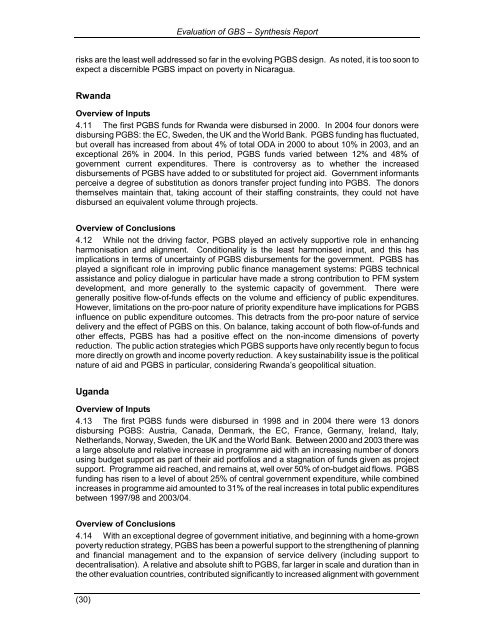Evaluation of General Budget Support: Synthesis Report - Belgium
Evaluation of General Budget Support: Synthesis Report - Belgium
Evaluation of General Budget Support: Synthesis Report - Belgium
You also want an ePaper? Increase the reach of your titles
YUMPU automatically turns print PDFs into web optimized ePapers that Google loves.
<strong>Evaluation</strong> <strong>of</strong> GBS – <strong>Synthesis</strong> <strong>Report</strong><br />
risks are the least well addressed so far in the evolving PGBS design. As noted, it is too soon to<br />
expect a discernible PGBS impact on poverty in Nicaragua.<br />
Rwanda<br />
Overview <strong>of</strong> Inputs<br />
4.11 The first PGBS funds for Rwanda were disbursed in 2000. In 2004 four donors were<br />
disbursing PGBS: the EC, Sweden, the UK and the World Bank. PGBS funding has fluctuated,<br />
but overall has increased from about 4% <strong>of</strong> total ODA in 2000 to about 10% in 2003, and an<br />
exceptional 26% in 2004. In this period, PGBS funds varied between 12% and 48% <strong>of</strong><br />
government current expenditures. There is controversy as to whether the increased<br />
disbursements <strong>of</strong> PGBS have added to or substituted for project aid. Government informants<br />
perceive a degree <strong>of</strong> substitution as donors transfer project funding into PGBS. The donors<br />
themselves maintain that, taking account <strong>of</strong> their staffing constraints, they could not have<br />
disbursed an equivalent volume through projects.<br />
Overview <strong>of</strong> Conclusions<br />
4.12 While not the driving factor, PGBS played an actively supportive role in enhancing<br />
harmonisation and alignment. Conditionality is the least harmonised input, and this has<br />
implications in terms <strong>of</strong> uncertainty <strong>of</strong> PGBS disbursements for the government. PGBS has<br />
played a significant role in improving public finance management systems: PGBS technical<br />
assistance and policy dialogue in particular have made a strong contribution to PFM system<br />
development, and more generally to the systemic capacity <strong>of</strong> government. There were<br />
generally positive flow-<strong>of</strong>-funds effects on the volume and efficiency <strong>of</strong> public expenditures.<br />
However, limitations on the pro-poor nature <strong>of</strong> priority expenditure have implications for PGBS<br />
influence on public expenditure outcomes. This detracts from the pro-poor nature <strong>of</strong> service<br />
delivery and the effect <strong>of</strong> PGBS on this. On balance, taking account <strong>of</strong> both flow-<strong>of</strong>-funds and<br />
other effects, PGBS has had a positive effect on the non-income dimensions <strong>of</strong> poverty<br />
reduction. The public action strategies which PGBS supports have only recently begun to focus<br />
more directly on growth and income poverty reduction. A key sustainability issue is the political<br />
nature <strong>of</strong> aid and PGBS in particular, considering Rwanda’s geopolitical situation.<br />
Uganda<br />
Overview <strong>of</strong> Inputs<br />
4.13 The first PGBS funds were disbursed in 1998 and in 2004 there were 13 donors<br />
disbursing PGBS: Austria, Canada, Denmark, the EC, France, Germany, Ireland, Italy,<br />
Netherlands, Norway, Sweden, the UK and the World Bank. Between 2000 and 2003 there was<br />
a large absolute and relative increase in programme aid with an increasing number <strong>of</strong> donors<br />
using budget support as part <strong>of</strong> their aid portfolios and a stagnation <strong>of</strong> funds given as project<br />
support. Programme aid reached, and remains at, well over 50% <strong>of</strong> on-budget aid flows. PGBS<br />
funding has risen to a level <strong>of</strong> about 25% <strong>of</strong> central government expenditure, while combined<br />
increases in programme aid amounted to 31% <strong>of</strong> the real increases in total public expenditures<br />
between 1997/98 and 2003/04.<br />
Overview <strong>of</strong> Conclusions<br />
4.14 With an exceptional degree <strong>of</strong> government initiative, and beginning with a home-grown<br />
poverty reduction strategy, PGBS has been a powerful support to the strengthening <strong>of</strong> planning<br />
and financial management and to the expansion <strong>of</strong> service delivery (including support to<br />
decentralisation). A relative and absolute shift to PGBS, far larger in scale and duration than in<br />
the other evaluation countries, contributed significantly to increased alignment with government<br />
(30)

















